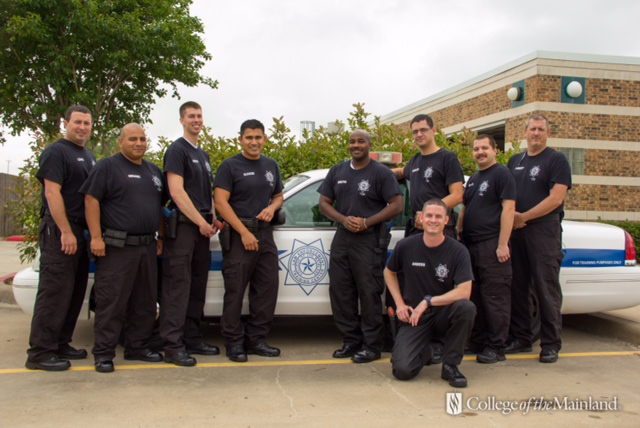COM Peace Officer Academy graduates 30

The streets are now a little bit safer thanks to a few new graduates.
On Friday, May 23, 30 cadets graduated from College of the Mainland's (COM) Peace
Officer Academy.
Highlights of the graduation ceremony included recognition of Theobold Spencer as
the top cadet for scholastics, as well as the bestowment of the Goerlich Award for
Leadership and Lem Powell Top Gun Award to Harold K. Smith and Kenneth W. Hernandez,
respectively.
Named after a cadet diagnosed with Stage 4 Cancer while enrolled in the academy, the
Goerlich Award is given to a student who selflessly pushes others to do better.
"Goerlich was diagnosed with cancer half way through the academy," explained BJ Whitburn,
director of training. "He went through chemo treatments and never missed a day. He
pushed his classmates in spite of all he went through, and finished the academy and
passed his state licensing exam.
"Shortly after, he started losing the fight," Whitburn continued. "He was visited
by Sheriff Freddie Poor in the hospital, where he was pinned with his badge. He passed
away a short time later.
"Harold really epitomized this award," Whitburn explained. "He was one of those quiet
cadets who was always there to push others along."
The Lem Powell Top Gun Award, named for the recently deceased long-time instructor
and range master Lem Powell, is given to the cadet with the top shooting score combination
of marksmanship, low light, no light, tactical skills, shotgun and patrol rifle.
Hernandez graduated from the academy with an overall shooting score of 98.84 percent,
impressive statistics for an academy that demands excellence.
Established more than 40 years ago, the innovative, semester-long, 769-hour Peace
Officer Academy is designed to meet the training requirements of the Texas Commission
on Law Enforcement Standards and Education, and prepares students to take the state
licensing exam.
To participate in the rigorous and selective program, students must first apply and
be accepted to COM, satisfy testing requirements, pass a criminal history background
check, have a high school diploma or GED and 12 college hours, complete a two-part
medical examination consisting of a physical exam and drug screening, and a psychological
examination.
"I am very proud of our cadets," Whitburn said. "They really are the best of the best."
For additional information regarding COM's Peace Officer Academy, visit www.com.edu/law-enforcement.
